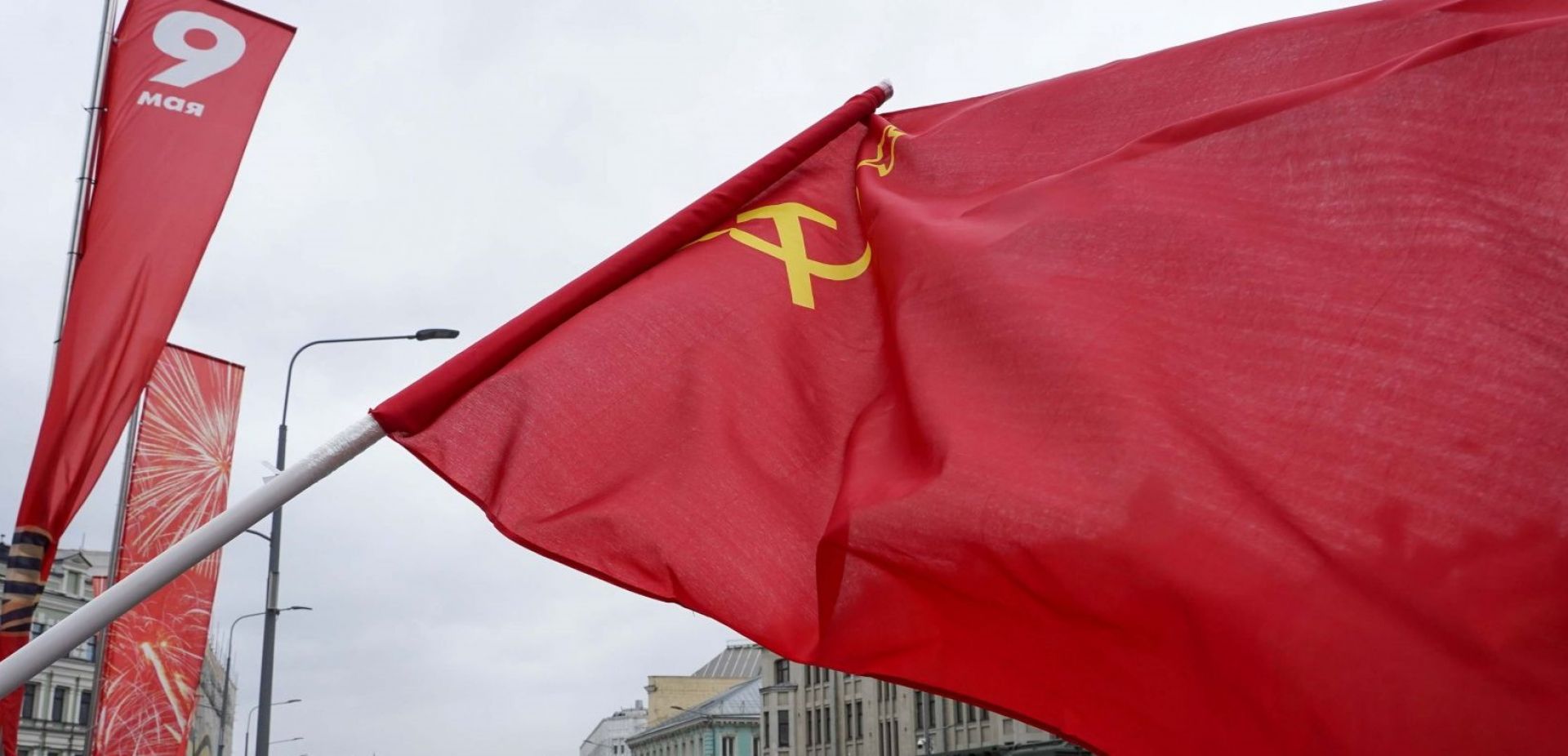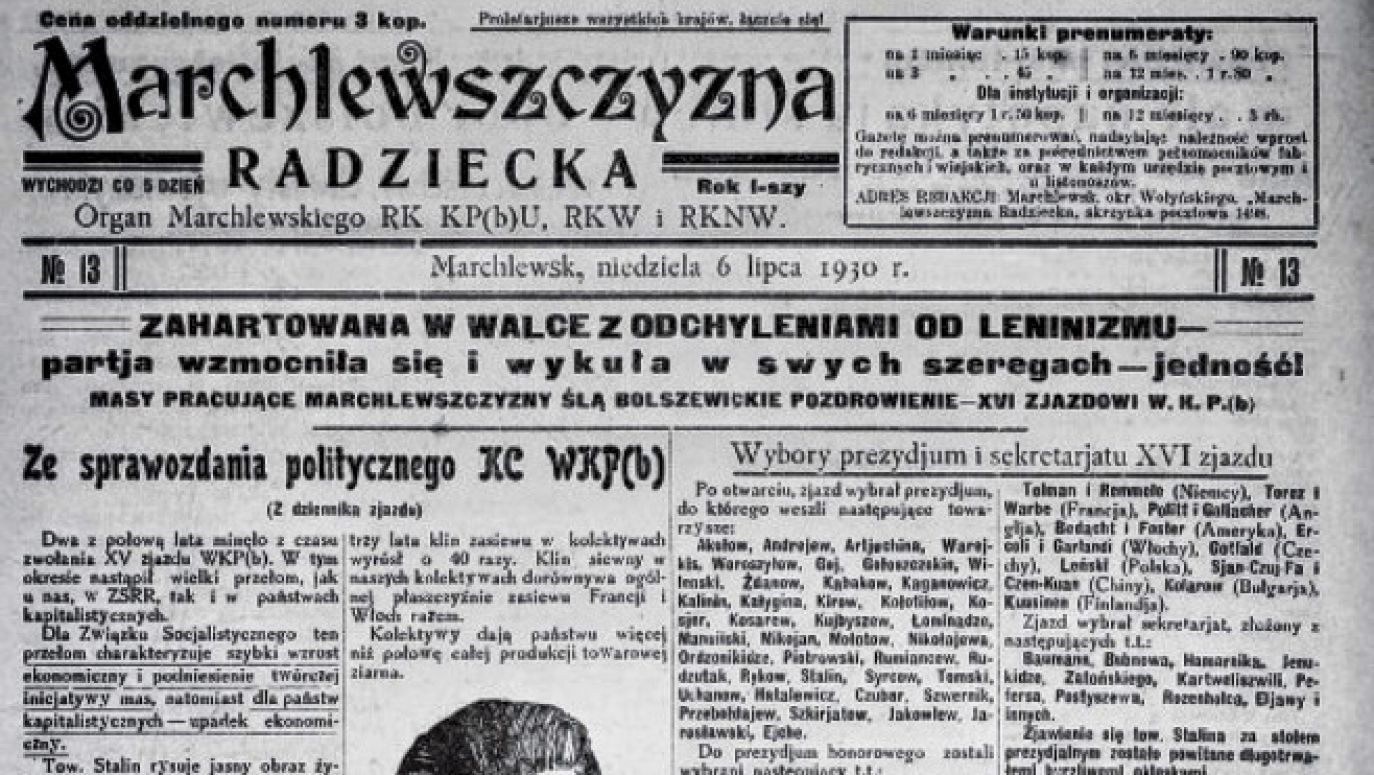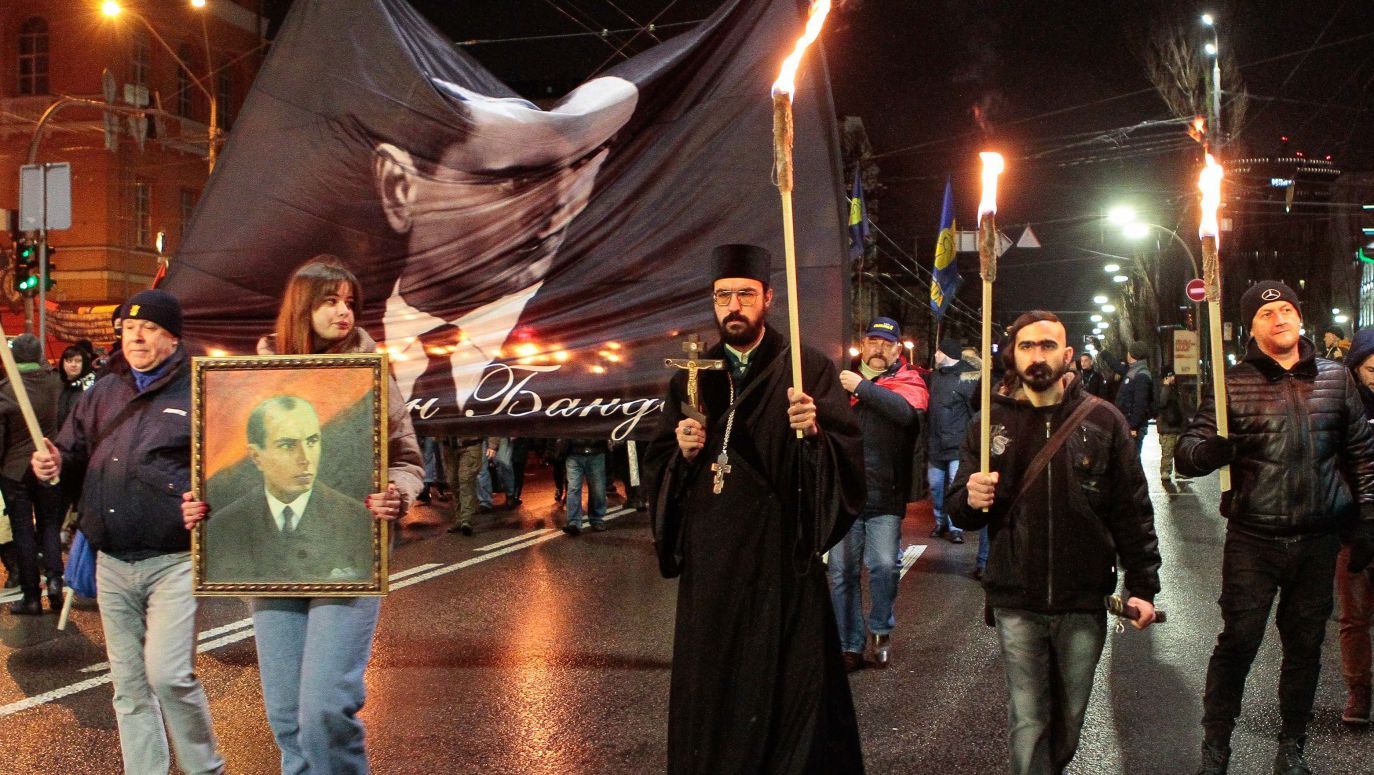There was "fascist Poland,", there is "Nazi Ukraine". Kremlin school of propaganda
23.03.2022
The EADdaily portal quoted Russian Foreign Ministry spokeswoman Mariya Zakharova as arguing that "Ukrainian nationalism and neo-Nazism is not a myth or Russian propaganda. (...) The roots of Nazism in Ukraine have strengthened over centuries, crippling many noble and free souls".
For years in the USSR and later in Russia, the word 'fascism' was synonymous with evil. Hence people referred to the Second Polish Republic, the enemy of the Soviets, as 'fascist Poland'. Today, Russian propaganda uses the word 'Nazism', and Ukraine and its President Volodymyr Zelenski appear to be 'Nazis'.
"The Great Soviet Encyclopaedia" defined fascism quite simply: "the political direction which arose in the capitalist countries in the period of the general crisis of capitalism, expressing the interests of the most reactionary and aggressive forces of the imperialist bourgeoisie. F. in power is a terrorist dictatorship of the most reactionary forces of monopoly capital, implemented in order to preserve the capitalist system. The most important features of fascism are the use of extreme forms of violence for the oppression of the working class and all working people, militant anti-communism, chauvinism and racism, the widespread use of monopoly methods to regulate the economy, the maximum control over all manifestations of the public and private life of the population not belonging to the ruling classes, the ability to mobilise and activate it politically through the use of nationalist and social demagogy in the interests of the system of exploitation."
This extremely simplistic view of fascism still functions today in Russia and other post-Soviet countries. Germany and Italy were fascist, and pre-war Poland was fascist. But today the word 'Nazism' has come into common use around the world. There is no such entry in the “Great Russian Encyclopedia”; there is "neo-Nazism" and "National Socialism," explaining in some detail the ideology of the NSDAP and its successors in Germany and beyond. In Russian propaganda, "Nazism" is supposed to be something much worse than "fascism", because it is directly derived from the ideology prevailing in Hitler's Germany.
The yoke of dictatorship
P. V. Lukowienko from the Ural Federal University named after Boris Yeltsin (!) in a study on the image of "fascist Poland" in Soviet propaganda writes that three stages can be distinguished in the interwar period.
The first began in 1917 and ended around 1926. - At that time, the Bolsheviks were just shaping their image of Poland, a negative one of course. The second period lasted until 1933 and Hitler's seizure of power in Germany, and the third until 1939. As the author points out, it was only in the second period that Poland was described in Soviet propaganda as a fascist state, just like other countries in Europe and North America.
In subsequent years, fascism was identified primarily with Germany and Italy. In the case of Poland, the word 'fascism' meant 'oppression of the masses of the working people', rather than any particular social system.
Let us take a look at what the press in the USSR wrote about Poland. In the interwar period, especially in the years 1925-35, there were several dozen newspapers and magazines published in Polish in this country, which devoted a great deal of attention to Poland (the author of this article described them in the book "Bolshevik Poles and Fascist Poland", published in 2019). These included “Trybuna Radziecka” (“Soviet Tribune”), published in Moscow, “Sierp” (“Sicle”) in Kiev, “Młot” (“Hammer”) and later Orka (“Plowing”) in Minsk, as well as many local newspapers, notably “Marchlewszczyzna Radziecka” (“Soviet Marchlewszczyzna”) from the Polish national district in Marchlewsk (today Dovbysh) near Zhytomyr (Julian Marchlewski was a leading Polish communist).
The symbol of "Polish fascism" after 1926 became in these writings Marshal Józef Piłsudski. He was the one who supposedly intensified the "exploitation of the people".
"Sierp" wrote in 1927 that "the Sejm passed Piłsudski's budget. This budget is a huge burden for the working masses. (...) Ripping the skin off workers and peasants, Piłsudski at the same time makes a gift of a hundred-million zloty to the landowners. (...) Saving the landowners and skinning the working people, Piłsudski does not think about meeting the needs of the latter. And - as the editors of the 'Trybuna Radziecka' stressed - the Marshal's activity was leading directly towards war: "The masses (...) driven underground by Piłsudski's fascist dictatorship, deprived of their media and the possibility to express themselves at rallies - are protesting against the war plans of England and its servant Piłsudski, speaking out against the Polish and international bourgeoisie - for the USSR, for the proletarian and socialist fatherland!
This is what the Polish government did: "Fascist policy towards the working class is consistently applied by the dictator Pilsudski: terror - on the one hand, deception - on the other". And the obvious conclusion in this situation: 'in Poland, the working masses are bending under the terrible yoke of fascist dictatorship'.
Of course, the Polish "fascists" persecuted the communists. In 1932, the Kiev " Głos Młodzieży" (“Youth Voice”) described the dramatic course of the execution of a convict in Baranowicze (now in Belarus): "The gallows broke after the noose was placed around the neck of the first victim. The executioner strangled the convict with his own hands by pulling the rope. The other convicts had to wait several hours for the gallows to be repaired. They were also forced to assist in the doctors' endless debates as to whether the first convict had already died. The priest added a grim tone to the strangling and hanging by waving incense around the gallows and mumbling prayers. The execution lasted no less than five hours. Fascism knows no bounds in its rascality. Not only does it murder workers on the gallows, but it tries to take the cruelty of execution to the extreme.
On the other hand, "Marchlewszczyzna Radziecka" described other tragic events: "recently a death sentence was carried out in Baranovichi on the Bobko brothers, convicted of alleged 'spying'. One of the hanged, when he was already hanging on the gallows, started to throw himself so violently that he threw himself twice over the cross-bar of the gallows. Those assisting at the execution ran away. Maciejewski's assistant, Braun, finished him off".
The murderer's primitive ideology

The Internet is full of information on 'zachistki' carried out by the Russian army in Ukraine.
see more
In 1933. "Marchlewszyczyzna Radziecka" wrote that "counter-revolutionary, Petluran, nationalist Ukrainian groups had and allies in the Polish sector. (...) Ukrainian chauvinism feeds Polish nationalism, which takes various forms and shapes - direct aggrandisement of Polish fascism and reactionary anti-Semitism up to the manifestation of national separatism in practical activity".
As we can therefore see, in the past the term 'fascists' was used to describe the supporters of Ataman Semen Petlura, Poland's ally in the war against the Bolsheviks. Today, those who rule Ukraine are 'Nazis'.
However, another cliché is used here. Stepan Bandera is identified as the historical leader of the Ukrainian Nazis; 'Banderaism', whatever that word means, is therefore Nazi. This is not the place to analyse Bandera's views or those of the Organisation of Ukrainian Nationalists - but it is also important to stress that references to him and to the OUN are primarily symbolic in Ukraine. Yes, there are groups that draw on nationalist ideology, but they are politically marginal.
The erection of monuments to Bandera and the naming of streets after him, although viewed very critically from the Polish point of view (until 1945, Poland was Bandera's arch enemy number), does not in the least mean acceptance of his ideas and thoughts.
However, the Russian propaganda presents it completely differently. It is enough to reach out to the country's media, which is difficult today because some Internet portals simply do not function, among other things due to the actions of Anonymous. But what you can read gives you an idea of the thinking of its creators.
The EADdaily portal quoted Russian Foreign Ministry spokeswoman Mariya Zakharova as arguing that "Ukrainian nationalism and neo-Nazism is not a myth or Russian propaganda. (...) The roots of Nazism in Ukraine have strengthened over centuries, crippling many noble and free souls". That is how it was stated by an official representative of the authorities.
The Regnum portal, on the other hand, gathered the opinions of internet users. "They are nobody. Ukraine is ruled by Nazis!" - they wrote. Well, but in the article, published on 6 March, there were voices saying that Volodymyr Zelenski fled to Poland, and after such a "betrayal and demonstration of cowardice by the President of Ukraine", the Ukrainian people will certainly want to remove him from office. The trouble is that Zelenski has not fled at all.
Unfortunately, the Russian narrative is intensively joined by Ukrainian traitors. Here, for example, the Tatarstan TV and radio portal quoted Ilya Kiva, a deputy of the pro-Russian Opposition Platform for Life in Ukraine's Verkhovna Rada. Kiva has a rather complicated past; he was active in the radical Right Sector, then head of the Socialist Party of Ukraine. In early February, he left for Italy and then for Russia.
As he says, 'Ukraine is steeped in Nazism, which has become the dominant ideology in the country'. Nazism has also infiltrated education. Moreover, "since the 2014 coup, Ukraine has been under external control, with appointments to key positions made by arrangement with the US embassy".
Former pro-Russian Prime Minister Mykola Azarov fled to Russia in 2014; Interpol issued an international arrest warrant for him. He is now speaking out for Russia's paper “Izviestia”.
In his opinion, "in Ukraine, Nazism transformed by Bandera has become the dominant ideology. This means that Bandera's ideology is the basis of the state. This is the primitive ideology of a murderer. All people are divided, according to this ideology, into several varieties. After all, it is known what the founder of this "movement" taught his followers. If you meet a Jew - kill, if you meet a communist - kill, if you meet a "Muscovite" - kill, if you meet a fake Ukrainian - kill. And a faker is someone who does not support Bandera's ideology, i.e. allegedly 'untruthful'. If three-quarters of the population is killed as a result of such ideology, a sincere, i.e. true, Ukrainian nation will emerge." The conclusion, drawn by Azarov, is simple and obvious: Ukraine needs "denazification".
Clichés still useful
Formerly Soviet and now Russian propaganda uses the same clichés. Fascism and Nazism are symbols of evil. Poland was evil, and continues to be so; President Vladimir Putin, after all, accuses us of involvement in triggering the Second World War. Ukraine is evil, and Nazism is also supported by the United States.
These methods are very simple, even primitive - but they are probably effective for a part of the Russian population. Those who once had only Soviet newspapers at their disposal now only watch, listen to and read the state-owned media. Because to find others, you have to look on the internet. And you have to want to look.
– Piotr Kościński
– Translated by Tomasz Krzyżanowski








